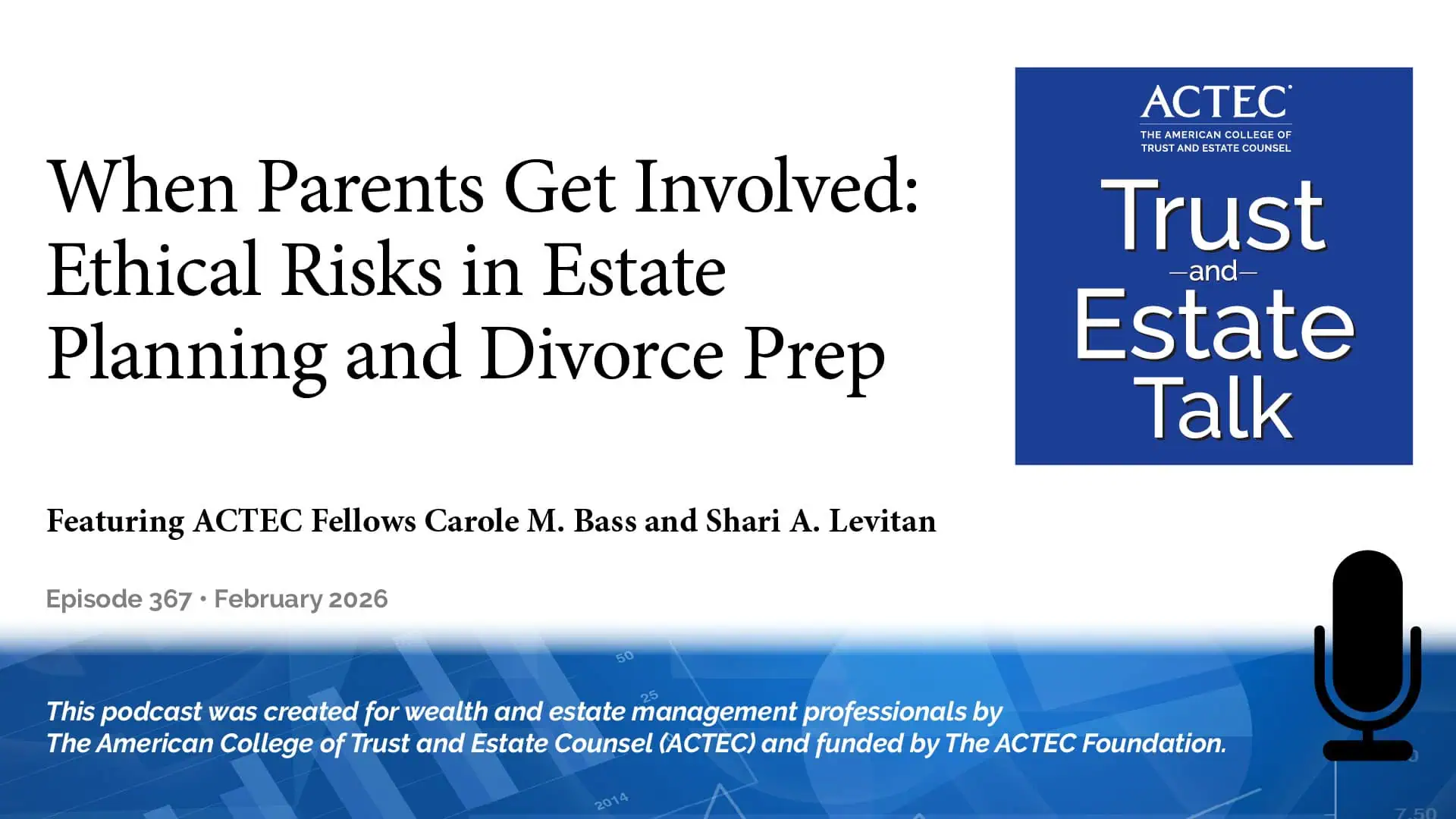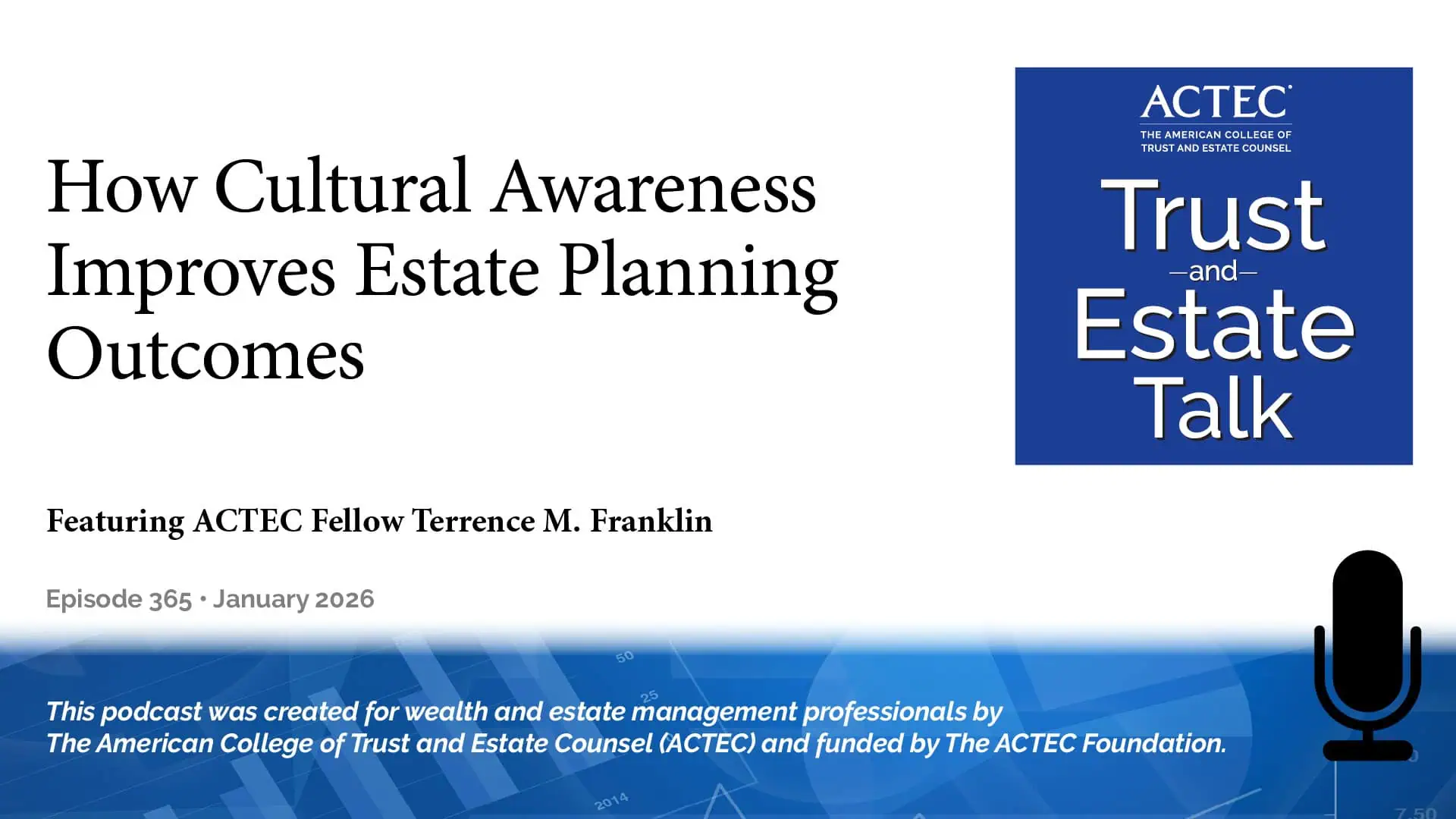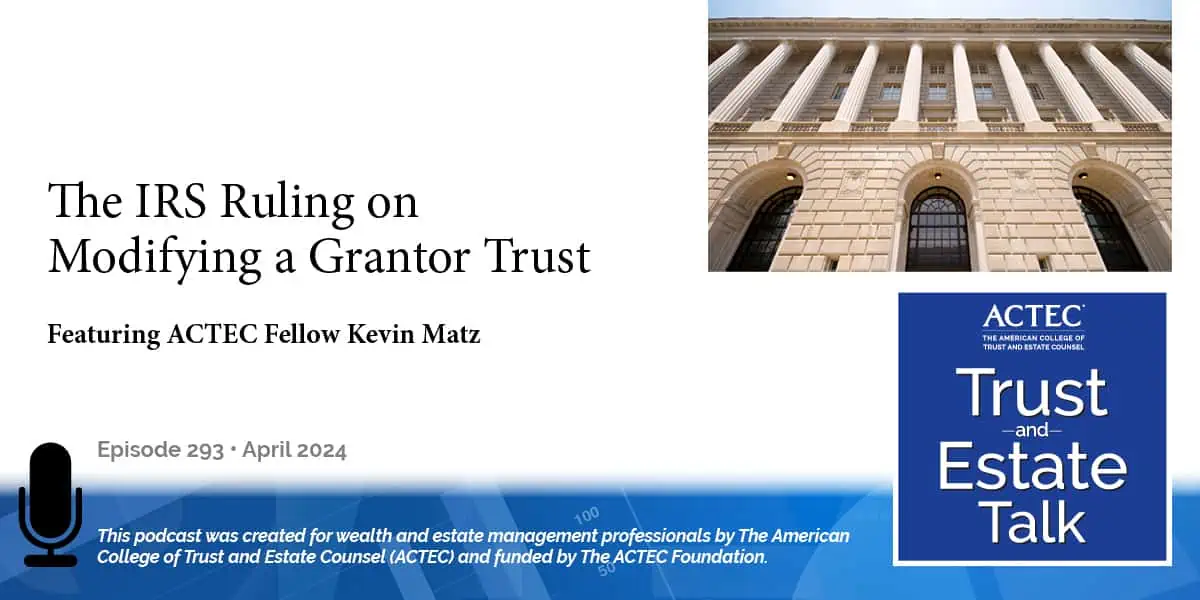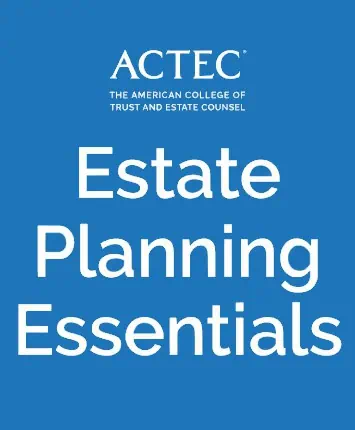The IRS Ruling on Modifying a Grantor Trust
The IRS Ruling on Modifying a Grantor Trust, that’s the subject of today’s ACTEC Trust and Estate Talk.
Transcript/Show Notes
This is John Challis, ACTEC Fellow from St. Louis, Missouri. The IRS Chief Counsel Advice 202352018 released at the end of 2023, ruled that trust beneficiaries have made a taxable gift by consenting to modify a grantor trust discretionary power in the independent trustee to reimburse the grantor for the income tax the grantor pays on the trust’s income. ACTEC Fellow Kevin Matz from New York City is here today to explain the CCA’s implications and consequences.
Welcome, Kevin.
Background and Context to CCA 202352018
Thank you, John. And hello, everyone. CCA 202352018, a number that is going to be, that we’re going to be remembering as estate planners, was released at the tail end, as John mentioned, of 2023- actually December 29th- and it addresses the gift task consequences of modifying a grantor trust to add a tax reimbursement clause.
Now, CCA, what is it? That is a Chief Counsel Advice. This is not a revenue ruling or anything like that. This is essentially someone in the field in the context of an audit, an IRS attorney, positing a question to the national office, and says: “Here’s a question. Please advise us.” This is essentially a litigation position. Think of it as a brief. It’s an advocate’s brief, the advocate here being the IRS.
With that background, the CCA raised the issue as follows. It said: “Okay, what are the gift tax consequences to the beneficiaries when the trustee of an irrevocable trust that is treated as a grantor trust as to its owner for federal income tax purposes modifies the trust,” here’s the key portion “with the beneficiary’s consent to add a tax reimbursement clause that provides a trustee that is discretionary power to make distributions of income or principal from the trust in amounts sufficient to reimburse the grantor for income tax attributable to the inclusion of the trust’s income, the grantor’s taxable income.”
The conclusion reached by the CCA- just a sort of a ‘spoilers alert’ here, but it’s very important to get it right at the outcome- was as follows: “This modification to add the tax reimbursement clause will constitute a taxable gift by the trust beneficiary,” why? “because the addition of discretionary power, distributed income, and principal to the grantor is a relinquishment of a portion of the beneficiary’s interest in the trust.”
Analysis of Gift Tax Consequences
Let’s deconstruct that. So, the recitation of facts of the CCA are as follows. So it says, “In year one, the grantor,” who let’s call the grantor, “person A,” so grantor A, “establishes and funds an irrevocable and inter vivos trust from the benefit-based child and child’s descendants.” Now, under the governing instrument of the trust, the trustee- who is an “independent trustee,” someone who’s not related or subordinate to the grantor with a meeting of Code Section 672C- “may distribute income or principal to or for the benefit of the child in the trustee’s absolute discretion.” Upon the child’s death, the trust remainder is distributed to the child’s issue per stirpes.
Under the governing instrument of the trust, A, again, A is the grantor and retains the power that causes grantor A to be the deemed owner of the trust under the grantor trust rules. Accordingly, all items of income, deductions, and credits attributable to the trust are included in A’s taxable income. The recitation of facts continues, and this part is very significant: Neither the state law, applicable state law, nor the governing instrument of the trust requires or provides authority to a trustee of the trust, distribute to A amounts sufficient to satisfy A’s income tax liability attributable to the inclusion of trust income in A’s taxable income. In year two, when the child has no living grandchildren or more remote descendants, the trustee, again this being an independent trustee, petitions the state court to modify the terms of the trust.
Now, pursuant to the applicable state statute, the child and the child’s issue consent to the modification. They outright consent to it. Then later that year, the state court grants the petition of the trustee and issues an order modifying the trust to provide a trustee the discretionary power, previously not held by that trustee, to reimburse the grantor for income taxes that the grantor pays as a result of inclusion of trust income in the grantor’s taxable income.
CCA 202352018 Background and Takeaways
Now, in development analysis, the CCA observed a number of things. I’m going to focus on a couple of them because they are very significant as far as the takeaways and things perhaps folks haven’t entirely thought about, but I think are very significant. Some background rules, there’s a cite to the Treasury regulations of gift tax regulations provides that a gift tax applies to gifts also indirectly made. Any transaction in which an interest property has gratuitously passed or conferred upon another regardless of the means of the device employed constitutes a gift sub or the gift tax.
It then cites Treasury regulation 25.2511-1e, which provides that if a donor transfers by gift less than the entire interest in the property, the gift tax is applicable to the transferred interest. Further, it then says that if the donor’s retained interest is not susceptible to measurement on the basis of generally accepted valuation principles, then the gift tax is applicable to the entire value of the property subject to the gift. Ouch, that would be everything.
Then there’s also a cite to a Treasury regulation 2511-2(a). It says, “the measure of the gift is the value of the interest passing from the donor with respect to which a donor is relinquished of rights without full and adequate consideration of money, money’s worth.” Next, this part is very significant, but I don’t think it’s gotten a tremendous amount of attention. I think it deserves a lot of attention. There is a reference to Treasury regulation 25.2511-2(b), which “provides a to any property or part thereof or interest therein of which a donor is so parted with dominion and control as to leave in him no power to change his disposition, whether for their own benefit or the benefit another, then the gift is complete.” It then goes on to say that if, however, certain powers are retained by the donor so that they do have the ability to change the disposition, then that portion is an incomplete gift. It says that no portion of the transfer is a completed gift.
Comparison with Revenue Ruling 2004-64
As we’ll talk about shortly, that portion is very, very significant. There’s also a reference in the analysis to Revenue Ruling 2004-64, which was distinguished in the CCA and refers to this revenue ruling in the following manner. In revenue ruling 2004-64, again, in this context here, the grantor created an irrevocable inter vivos trust for the benefit of grantors’ descendants and retains sufficient power so as to cause the trust to be a grantor trust as to the grantor for income tax purposes. In relevant part, again, this is the CCA’s analysis of that revenue ruling 2004-64. It says in relevant part, that the ruling considers two situations in which a trustee reimburses the grantor for taxes paid by the grantor that is attributable to the inclusion of all or part of the trust income, the grantor’s income.
In situation two of Revenue Ruling 2004-64, “the distribution reimbursing the grantor is mandated in the terms of the governing instrument.” Parenthetical here: that of course would cause estate tax inclusion, so we don’t ever want to do that, but that is one of the situations that’s outlined in Revenue Ruling 2004-64.
Then in situation three in Revenue Ruling 2004-64, “the governing instrument provides the trustee with discretionary authority to make a reimbursement of distributions.” The CCA then concludes an analysis that in both of these situations, when the trustee of the trust reimburses the grantor for income tax paid by the grantor, Revenue Ruling 2004-64 concludes that the payment does not constitute a gift by the trust beneficiaries. Why? Because the distribution was either mandated by the terms of the governing instrument or made pursuant to the exercise of the trustee’s authority was granted under the terms of the governing instrument.
The CCA then turns to its conclusion based upon that analysis. So it then says and unfolds it as follows. “It says under the governing instrument, you have child and child’s issue, each having an interest in the trust property.” It then says that as a result of this year-two modification of the trust grantor A, remember grantor had no interest, but now is acquiring a beneficial interest in the trust property, in that A is now becoming entitled to a discretionary distribution of income or principal from a trust in amount sufficient to reimburse the grantor for any taxes the grantor pays the result of inclusion, the trust income and grantor’s gross income.
In substance, according to the CCA, the modification constitutes a transfer by child and child’s issue for the benefit of A. The CCA then says that this is distinguishable from the situations in revenue ruling 2004-64, as I mentioned, where the original governing instrument, in contrast, provides for a mandatory discretionary right of reimbursement for the grantor’s payment of income tax. Thus, the CCA concludes as a result of this year-two modification, child and child’s issue have made a gift of a portion of the respective interest in income and/or principal.
Also significantly, the CCA says that the result and this is sort of dicta, it was not the situation presented here, but you could imagine how this could possibly apply to, say, trust decanting or other contexts. It says that the result would be the same if the modification was pursuant to a state statute that provides beneficiaries with a right to notice and a right to object to modification and a beneficiary fails to exercise a right to object. The CCA also acknowledges that it was essentially overruling a prior position that it had taken in PIA- in a Private Letter Ruling, Private Letter Ruling 2016-47001, which held that such sort of modification was simply administrative in nature and didn’t constitute a change of beneficial interest in the trust result in the gift. It said, “These conclusions no longer reflect the position of this office.”
Valuation Considerations
Then, what about valuation? This is very interesting. The CCA says, okay, if further, it says that, well, the gift from child and child’s issue of a portion of their interest in trust should be valued, how do you do it? It accordance with the general rule for valuing interest and property for gift tax purposes.
How do you go about this? In a footnote, the CCA adds that “although the determination of the values of the gifts requires complex calculations, the child and child’s issue cannot escape gift tax on the basis of the fact that the gift is difficult to calculate.” Ouch, it’s like don’t let the door hit you on the way out. That’s really, really tough.
Is this the end of the analysis, though? You know what? My thoughts on this, remember that I mentioned something about completed gifts versus incomplete gifts. Let’s take a step back and think about what’s happening as a result of this consent, this modification. We have child and child’s issue, let’s just focus on the child. A discretionary beneficiary of a trust who is consenting to add an additional beneficiary, the grantor, for amounts that could be reimbursed, but that child who’s a beneficiary continues to be a beneficiary of the trust. So, the way I would analyze it, certainly under New York state law, but presumably unless you have an asset protection trust jurisdiction in which this circumstance would invoke it, you may have an asset protection trust jurisdiction, which does not have these circumstances invoke it, but that is a self-settled trust. The beneficiary is effectively making a transfer into a trust as to which she or he is a discretionary beneficiary. That is a situation that, under many states’ laws, including New York law, is actually considered void against that transfers’ creditors. And if it’s void against transfer creditors, that means that you can relegate. You can change the disposition by saying, well, I’m going to, take on claims and I’ll have creditors and they can be relegated. They can dig into this and that could possibly deprive persons of who gets what.
Incomplete Gifts and Estate Tax Implications
There’s a Revenue Ruling from 1976, 76-103 that says that if you have a transfer to a self-settled trust in which creditors are relegated, could be relegated to the transfer, you have an incomplete gift for gift tax purposes. Very significant, an incomplete gift for gift tax purposes, which means that this possible gift may not be complete until the money actually gets distributed out to the grantor at some point in time. Not at the get-go, not at inception from day one, but at some later point in time. That’s something I think you have to consider.
Now, a further aspect of Revenue Ruling 76-103, it does also say not only is it an incomplete gift, but what happens if that transferor dies, whose self-settled trust, there is estate tax inclusion under 2036(a)(1). That is something that needs to be considered, too. The one item that I would note here, however, is that there is an exception to estate tax inclusion under Section 2036, where there is a bona fide sale for full and adequate consideration of money and money’s worth. And query, I do not know the answer, but query whether or not these sorts of circumstances in which you have an independent trustee commencing the modification upon the consent of the beneficiary could perhaps invoke the bona fide sale exception of Section 2036.
So those are my thoughts on CCA 202352018, a CCA whose number is going to be emblazoned upon estate planners’ lips, probably for quite a while to come. And I thank you all for your kind attention.
John Challis: Thank you, Kevin, for a wonderful discussion of the implications and consequences of this CCA.
You may also be interested in:
Latest ACTEC Trust and Estate Talk Podcasts

When Parents Get Involved: Ethical Risks in Estate Planning and Divorce Prep
When parents join prenup or divorce planning, ethical risks follow. ACTEC Fellows explore privilege, conflicts, and protecting the attorney-client relationship.

Useful But Overlooked Trusts: A Planner’s Guide to When and How to Use Them
Explore overlooked trusts—including HEETs, alimony, voting, and blind trusts—and when estate planners should use them to address complex client needs.

How Cultural Awareness Improves Estate Planning Outcomes
How cultural awareness improves estate planning outcomes, with insights on the racial wealth gap and strategies for more effective, inclusive client guidance.



